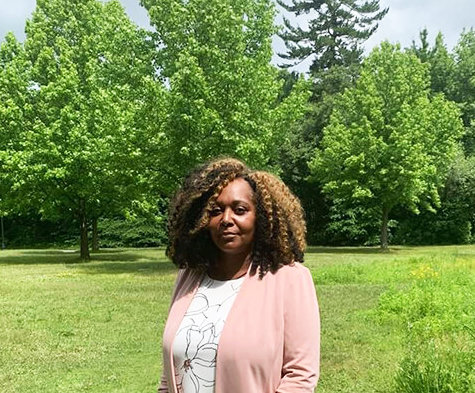Taking root
A cooperative community garden to empower former convicts finds fertile ground in Pawtucket
PAWTUCKET – A new kind of community garden is in the works in Pawtucket, R.I
Roots 2Empower will be a cooperative community garden where formerly incarcerated men thrive and grow just like the plants they will nurture.
The concept is the brainchild of Tarshire Battle, a mental health discharge planner for the Rhode Island Department of Corrections. Her brother was formerly incarcerated, and his story inspired her to set down roots for her endeavor.
“You know, when you’re affected by certain things, they make you want to do something to kind of change the system,” Battle said.
She remembers the moment she found out her brother was being sent to Texas to serve his five-year prison sentence.
“I was doing my homework, and I’m looking at the TV, and I’m like, ‘Mom, I think that’s Kenny getting on the plane,’” she said.
Battle’s brother was arrested in the 1990s during the crack epidemic in Boston.
“My brother is a formerly incarcerated person, and he was one of the people that was flown to Texas because the prison system was so overcrowded,” said Battle, a longtime Pawtucket resident. “There was an agreement between the Massachusetts criminal-justice system and Texas to take the overflow of inmates, but they didn’t let family members know.”
Instead, she and her family had to find out through a TV news report.
Following her brother’s release, Battle remembers his frustration at trying to get a job. He had taken technical courses before his incarceration, but no one would hire a former inmate.
“So his girlfriend at the time said, ‘Why don’t you start your own business? You have the support of me, you have the support of your family, and you want to do this, you’re good with construction and stuff like that,’” Battle recalled. “And so I actually cosigned for his first truck; his girlfriend got him some tools, and made business cards and started getting him out there.”
Hiring former convicts
Today, Kenneth Battle runs Massachusetts-based Before & After Construction LLC, which makes a point to hire former convicts.
His story, coupled with Battle’s experience as a mental-health professional, inspired her to find a way to provide an entrepreneurship opportunity for formerly incarcerated men while at the same time connecting them to the land around them.
“Even though I went to school professionally for mental health and I have a master’s in mental health, I moved toward what can be done on the outside versus on the inside,” Battle said. “I work on the inside as a contractor but I think more can be done on the outside, and I keep seeing a revolving door of people coming back. So, I thought, what can be done on the outside to break that cycle?”
Her answer: Roots 2Empower, a co-op/nonprofit hybrid that will pair formerly incarcerated people with farming and entrepreneurship. The organization’s plot of land is just off Exit 26, tucked behind Interstate 95 on Gibson Avenue and Sherman Street.
“I'm the earthy type,” she said. “I’m an artist. I’m a person that’s more creative, and so I am looking to connect these men back to the environment.”
But one challenge Battle foresees is the connection between farming and slavery, which might prove traumatizing for some formerly incarcerated Black men.
A legacy of one's own
“We’re looking to connect these men back to the environment, but I’m also looking at possibly having further education around the history, breaking down the negative historical legacy and also showing that there are people that came out of that and made farming their own,” she said. “I think of Fannie Lou Hamer, who did advocacy work and promoted farming co-ops. It’s a viable place to start, and it doesn’t mean that this is your end, but this is a start of making your own personal venture.”
Battle stressed that Roots 2Empower isn’t a place that just trains people and sends them on their way. Instead, it’s a place where participants have ownership, a stake in the organization’s mission.
“I thought to myself, why not use a cooperative model as a way of bringing business ownership to people who are formerly incarcerated that have barriers to employment,” she said. “Let's connect this co-op model with a nonprofit training model to see if it works, instead of going the education route, which a lot of people tend to do with the formerly incarcerated. I’m thinking, let’s just go the direct entrepreneurship route.”
She eventually hopes to sell value-added products, and collaborate with various food start-ups and other organizations to bolster the program.
Battle also sees Roots 2Empower as a way to bring fresh produce to Pawtucket, a community that is often left out of the conversation when it comes to urban farming.
“If you look at Pawtucket, we only have four community gardens,” Battle said. “That was my push to have it here. I know that Providence has the bulk of them, but we still have a lot of open space that could be utilized for urban gardens, and to not let developers come in and do what they’re about to do with gentrification, but actually use this space to provide education and opportunity, and to grow locally grown foods that benefit the community.”
Grace Kelly is a reporter with ecoRI News, who recently celebrated her first anniversary with the digital news platform.
The article is reprinted with permission of ecoRI News.






